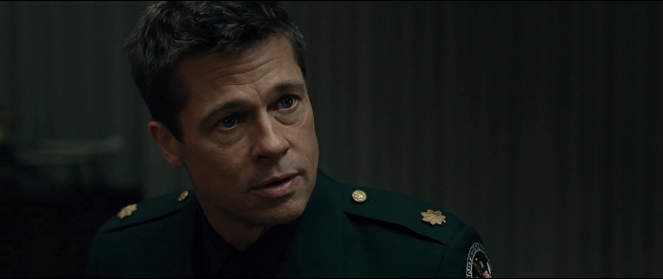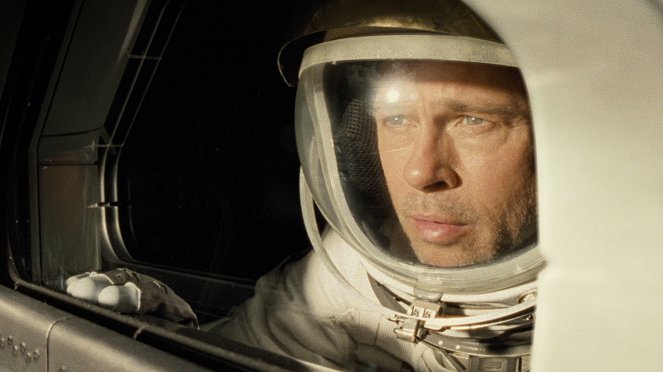Directed by:
James GrayCinematography:
Hoyte van HoytemaComposer:
Max RichterCast:
Brad Pitt, Tommy Lee Jones, Ruth Negga, Donald Sutherland, Liv Tyler, Kimberly Elise, Loren Dean, Donnie Keshawarz, Sean Blakemore, Bobby Nish, John Finn (more)VOD (4)
Plots(1)
Astronaut Roy McBride (Brad Pitt) travels to the outer edges of the solar system to find his missing father and unravel a mystery that threatens the survival of our planet. His journey will uncover secrets that challenge the nature of human existence and our place in the cosmos. (20th Century Fox Home Entertainment)
Videos (6)
Reviews (15)
Coppola’s Apocalypse Now in a sci-fi guise, with the same structure and the same orientation points. Gray’s tribute to the master. The same as the book by Conrad that it’s based on, this is a story of the essence of man and our role in the environment in which we live. The result isn’t the same, but that doesn’t matter. The journey to find your father is more important than the destination. There is no lack of action scenes and Hoyte van Hoytema outdoes himself again. Visually, it is like manna for the eyes. Pitt’s voiceover as the guide with a mental state of stoic calm, who doesn’t like people, works excellently. As does the father figure veiled in secrets, played by Tommy Lee Jones. The universality of this story about loneliness is made more intense by the emptiness of space. The laws of physics are not too important here. Despite all the big scenes, it’s an extremely low-key movie. A meditative masterpiece that isn’t for everybody, but few people will walk away completely unsatisfied.
()
Ad Astra is a film that is easy to shoot down or mock with a withering catch-phrase, but which nevertheless hypnotically draws in the viewer and long afterwards smoulders in one’s mind. It is impossible to avoid the impression that something is simultaneously missing and excessive, whether monologues, action scenes or pulpy elements thatturn contemplative absorption into amused mockery. Like a cosmic Heart of Darkness, Ad Astra gives the impression of being abridged, as if a full range of other stops on the road to the destination have been bypassed. Glimmers of the film’s world give the sense of a well-thought-out future and colonisation of the solar system. Director James Gray's film comes across asa several-hour miniseries that has been edited down and promises the possibility of not only seeing more of everything but, primarily, getting everything in a more sophisticated, dramaturgically refined and, above all, more slowly flowing form. I very much would have liked Ad Astra’s runtime to be twice or even three times as long, with proportionately more stops in space and some motifs more thoroughly developed. In its actual form, it is a sort of Reader’s Digest, the fragments of which do not conceal the masterful filmmaking and give a sense of an epic vision.
()
Gray further develops the theme of dysfunctional communication between immediate family members. They are unable to establish a dialogue because they escape into their own individual worlds and stay in their usual models of existence. Though Gray remains thematically and stylistically consistent, his view is more ambitious from film to film, while the protagonists’ ambitions grow accordingly. The distance that they had to overcome in an effort to find common ground was previously insurmountable only in a figurative sense. In Ad Astra, the distances between the protagonists are literally astronomical. This brought about a reinforcement of the main idea of Gray’s filmography – regardless of how far we roam, a place that gives meaning to our existence will always be in reach. ___ Recurring reservations about Gray’s latest work have a paradoxical nature. Critics admonish the film for not eliciting a stronger emotional response because of its monotonousness and ponderousness, while also saying that it is too literal, too obviously predictable and banal in its message. It’s as if they couldn’t see that the tension between the emotional distance on the one hand and the effort to share as much as possible on the other hand is the driving force of the film as well as its crucial distinguishing element. This duality is reflected as early as in the introductory action scene. The impression of vertigo evoked by the sight of a falling body and the POV shots contrasts with the icy calm of McBride, who matter-of-factly informs his commanders how he intends to handle the situation. The fact that he reacts to a lethally hazardous situation as if he has nothing to lose offers a relatively precise image of the main protagonist. ___ The uncertainty under whose influence the protagonist deviates from the mission’s objective is initially reflected in the words, actions and facial expressions of the supporting characters and later in Roy’s voiceover. The spectacular expedition to obtain knowledge gradually transforms into intimate family therapy. The film increasingly shifts from action to introspection, from broad strokes to details. This stylistic development corresponds to the growing scepticism with which Ad Astra frames heroic deeds. Acts of heroism performed only to satisfy one’s own ego or as a means of avoiding seemingly banal relationship commitments are, from the film’s viewpoint, a path to loneliness and social isolation. During the protagonist’s odyssey, people and animals die for no reason and, in the end, the main benefit of Roy’s mission is not finding the lost patriarch. He must go through this in order to reveal the reality concealed behind the myth that has been created around his father. ___ Roy uses an idealised image of himself based on his father’s upbringing as a shield against reality. Therefore, it is important that we have access to his concept of himself and can see or, as the case may be, hear how he gradually becomes disturbed by facts that do not correspond to the mythologised image of his father. Due to the pathological introversion of the protagonist, Gray decided to use a voiceover, which reflects Roy’s feelings in the present tense, not retrospectively, and thus continuously takes his character development into account. However, Roy’s detached tone of voice and the lack of passion in the sentences he utters do not primarily indicate strict work discipline, but rather his emotionally anesthetised state. He is incapable of openly communicating with others and talks to himself as if to the computer terminal in front of which he has to undergo regular psychological evaluations. He is inspected both internally and externally. ___ A certain warmth is present only in brief flashes of memories of his mother and former partner, for whom Roy was never fully present because he clung too tightly to his father’s legacy. Also, when questioned about his father’s disappearance during a work briefing, he symptomatically recalls not how he reacted to the event, but how his mother reacted. The fleeting presence of women in the narrative is legitimised by the filtering of all events through the perspective of a man who is unable to connect with his own emotions, let alone those of his loved ones. Roy mistakenly seeks understanding from his father, whom he admires for his career successes. In Roy’s voice-over, the two men merge from the beginning, when he derives his own worth from doing his own job well. However, the person who anchors him in the present, who defines the beginning and end of his story, is a woman, who represents his future, as she brings him back to life. ___ The way the film is constructed does not in fact needlessly double the message that it conveys. We do not hear offscreen what we see, but we see what Roy sees and perceives. Together with flashbacks, the parallel narration of various stories layers the seemingly straightforward monomyth about the protagonist’s journey, thus making it diverse and stimulating. The structure sets the text and the subtext against each other by maintaining distance from the hero and letting him comment on his changing position in the heroic narrative. Gray did not make a film that was spiritual or poetic, but one that is especially intellectual, particularly by revitalising the basic building blocks of adventure stories. Layer by layer, the film unmasks the heroic myth in order to show, based on the example of one flawed hero, how unstable the myth’s foundations are and thus it has to work on a different principle than that of traditional Hollywood genre movies, which merely recycle the myth. Ad Astra offers an emotionally powerful experience not in spite of its subdued nature, but precisely because of it. 90%
()
(less)
(more)
Ad Astra is a psychological analysis of the mind of an astronaut who has to sort out his relationship with his dead (?) father. This is no spectacular sci-fi hit, but a cleverly written, self-reflective monologue of Brad Pitt’s character about inner doubts regarding the sense of absolute devotion to his work at the cost of deviating from the path where his heart is telling him to go. Space travel, though nicely conceived, makes the film “only” visually more attractive and adds a magical philosophical dimension. The climax may even disappoint some hardcore sci-fi fans expecting something big to happen. The film is akin to Chazelle’s First Man, which was, however, more emotional and fragile.
()
A more intimate version of Interstellar, with similar formal opulence, musical arrangement and philosophy, but less ambitious artistically and script-wise, without a climactic finale or even highlight scenes. A cosmic father-son relationship drama and a story about making the right life choices and decisions that doesn’t take place exclusively on planet Earth. Brad Pitt is again fantastic.
()



Ads